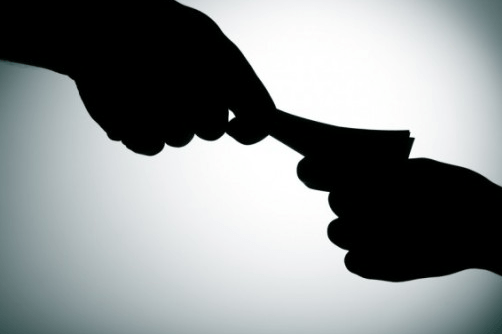New report says Nigerians paid $4.6b in bribes in 2016, but how much did Ghanaians pay?
 A new report released this week says in 2016 Nigerians paid a total amount of N400 billion, equivalent to $4.6 billion in bribes.
A new report released this week says in 2016 Nigerians paid a total amount of N400 billion, equivalent to $4.6 billion in bribes.
The authors say they combined the total number of people who paid a bribe to a public official with the frequency of those payments to arrive at the estimate.
It is however not clear how much Ghanaians paid in bribes within the same period, even though there is a website where citizens can post reports about bribery, it is not possible to estimate the amount involved.
According to the outcome of a survey conducted by the country’s National Bureau of Statistics (NBS) and the United Nations Office on Drugs and Crime (UNODC) titled, the National Corruption Report titled: ‘Bribery: Public experience and response 2017’ found that the amount was paid in the 12 months between 2015 and 2016 to public officials across 36 states and the country’s political capital, Abuja.
The report found that almost a third of Nigerian adults (32.3 per cent) who had contact with a public official between June 2015 and May 2016 had to pay, or were requested to pay, a bribe to that public official.
About 90.2 per cent of those living in the North West believe that government is very effective in fighting corruption.
The report indicates that taking into account the fact that nine out of every ten bribes paid to public officials in Nigeria are paid in cash and the size of the payments made, it is estimated that the total amount of bribes paid to public officials in Nigeria in the 12 months prior to the survey was around 400 billion Nigerian Naira (NGN), the equivalent of $4.6 billion in purchasing power parity (PPP).
“This sum is equivalent to 39 per cent of the combined federal and state education budgets in 2016,” it said.
It noted further that since bribe-payers in Nigeria pay an average of 5.8 bribes over the course of one year, 92 per cent of which are paid in cash, they spend an average of NGN 28,200 annually on cash bribes ― equivalent to 12.5 per cent of the annual average salary.
While the report found that money is by far the most important form of bribe payment in the country, the survey shows that other forms of bribe payment, such as the provision of food and drink, the handing over of valuables or the exchange of another service or favour, also exist, including sexual favour. But the actual extent of sexual favours as a form of bribe payment is not known.
The points out that 42 per cent of bribes are paid to speed up or finalize an administrative procedure that may otherwise be delayed for long periods or even indefinitely, the second largest proportion of bribes (18 per cent) is paid to avoid the payment of a fine, while 13 per cent of all bribes are paid to avoid the cancellation of public utility services.
Police officers, according to the report receive bribes the most, prosecutors come in second at 33 per cent, and they are closely followed by judges and magistrates, at 31.5 per cent.
By Emmanuel K. Dogbevi
